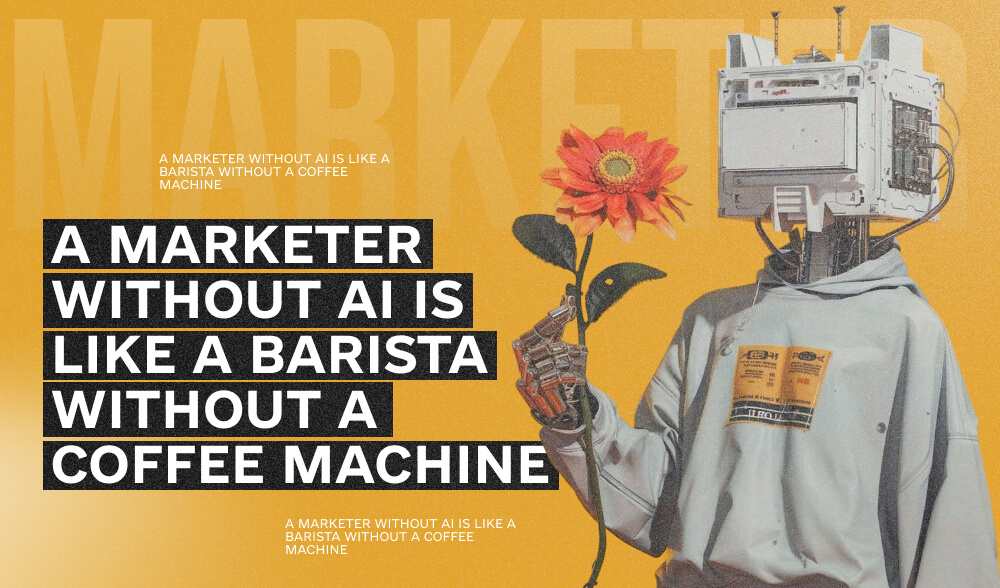Don't miss interesting news

Once upon a time, the idea that a machine could write an advertising text or a banner for social media sounded like a science fiction story. However, 2025 proves that artificial intelligence has become commonplace in marketing, and specialists who know how to work with it save businesses money. An AI marketer is a person who combines the experience of a strategic marketer, data analyst, and neural network trainer.
A marketer without AI today is like a barista without a coffee machine or a bayer without a tracker: you can work, but it is expensive, long, and nervous. The world is not waiting, and while someone is suffering with spreadsheets, neurons are already generating strategies, calculating ROI, and selecting tracks for viral Reels.
This article will help to understand why AI marketers will become more valuable every year, what skills they have, and what companies should pay attention to to keep up with competitors.

An AI marketer is a specialist who skillfully integrates artificial intelligence into all stages of marketing, from idea to evaluation of results. It is able to collect and analyze large amounts of data, uses generative models to create content, knows how to build automated campaigns, segment audiences by behavior, and works with chatbots. It is a combination of creativity and algorithmic thinking, ability to structure data.
A classic marketer relies on data (depending on how well he/she can understand it), experience, and a bit of intuition, an AI marketer relies on data and models, is more precise, but complements the work of AI with emotionality and storytelling. He strengthens the team by taking over the routine and leaving more time for strategy, creativity, and building relationships with the client.
An AI marketer collects data from CRM, social media, and web analytics and creates hyper-personalized offers: product recommendations, dynamic banners, and email campaigns tailored to each individual. Without magic, they adapt AI to the context of the company and its tasks as much as possible, and train it for themselves.
The use of neural networks to create texts, visuals, or videos for key queries, audiences, etc. One person with AI power can create dozens of ad variants and test them in real time. While the copywriter creates strong messages and a global brand legend, the bot analyzes trending topics and suggests ideas for TikTok videos.
Building models for forecasting customer churn, budget planning, determining the best channels and time of advertising. AI acts as an oracle here: according to statistics, but it seems to see the future.
Development of scenarios for chatbots that answer customer requests, collect leads, and even close sales without the participation of a manager. The development of such an “eternal consultant” that never sleeps and never takes a sick leave, only occasionally needs to be adjusted, is in demand now.
Automated A/B testing with the selection of color, font, CTA, and audience; AI independently selects the winning options and scales them. It literally gives strong hypotheses of what the audience will like.
Tracking reviews and comments on social media, detecting and dealing with hate, adhering to privacy policies and ethical standards when using AI. Here, AI marketers play the role of Sherlock Holmes a bit more.
Since the role of an AI marketer is at the intersection of marketing, technology, and psychology, the list of competencies may surprise those who thought it was an easy one:
Understanding of consumer behavior, ability to build funnels, knowledge of different communication channels, and the basics of brand strategy. This is the foundation: without it, no neural network can create a successful creative, just like a cook can’t bake a great cake without flour.
Skills of writing texts that attract attention and sell, as well as the ability to “teach” the neural network to work in the right tone. Remember: even a brilliant bot won’t protect you from boring.
The ability to read and interpret data, work with tables, graphs, and understand the principles of machine learning, even if it is not about programming. Here, an AI marketer is like a sommelier: he/she doesn’t just taste the data, but has to understand the vineyards from which it came.
Formulating effective queries for generative models. If you ask ChatGPT or Midjourney, you will get this quality. This is the art of asking questions: if you don’t use the “magic” structure of a prompt, you get an abracadabra.
Awareness of the risks associated with algorithmic bias, privacy, and copyright; ability to build processes so that AI works transparently and without harming the brand. Because no one wants their work to become a meme because of an AI output gaffe.
If AI used to be a “let’s play around, let’s test this feature” attitude, today it is a full-fledged player in the marketing team.
The real value of AI marketers is in measurable results. Here are some recent facts that speak for themselves:
The British building materials giant implemented predictive analytics to identify customers who might fall out of favor. The AI model tracked changes in customer behavior and sent managers alerts weeks in advance of the risk of churn, enabling them to use omnichannel communications to re-engage these customers before they disengage. The result: a decrease in churn by 54% and retention of a significant portion of the turnover.
American marketing platform BrandXR integrated AI hyper-personalization into customer campaigns: the system analyzed purchase history, website behavior, and external factors to show relevant content at the right time. The result: a 1.7-fold increase in conversion and a 28% reduction in churn
Will AI replace humans in marketing? No, it won’t. Human empathy, creativity, and strategic vision remain unchanged. Artificial intelligence takes over analytics, automation, and variant generation, but people still make decisions. New roles are on the horizon: AI content strategists, product engineers, specialists in the ethical use of algorithms, etc., and this is okay in a time of rapid change.
The main thing for business is not to sit idly by. Teach your team to work with neural networks, experiment with scenarios, integrate AI solutions into existing systems, but do not forget about the ethics and sincerity of your brand.